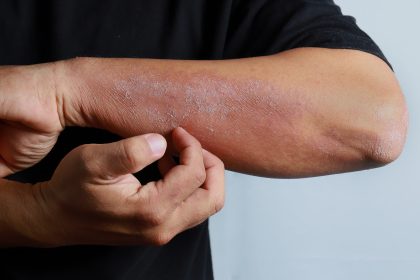Your psoriasis isn’t just randomly deciding to ruin your week. Those red, scaly patches that seem to appear out of nowhere are actually responding to specific triggers that might be lurking in your everyday routine without you realizing it. Understanding what sets off your flare-ups is like having a secret weapon against this frustrating autoimmune condition.
Psoriasis affects millions of people, causing the immune system to speed up skin cell production so dramatically that new cells reach the surface in days instead of weeks. The result is the thick, scaly patches that can appear anywhere on your body and make you want to hide under long sleeves year-round.
Stress becomes your skin’s worst enemy
Stress and psoriasis have a twisted relationship that creates a vicious cycle. When you’re stressed, your body releases hormones that can trigger inflammation and worsen psoriasis symptoms. Then, dealing with visible psoriasis symptoms creates more stress, which triggers more flare-ups.
This doesn’t mean you need to eliminate all stress from your life, but finding healthy ways to manage stress can significantly impact your skin. Whether it’s regular exercise, meditation, or just ensuring you get enough sleep, stress management becomes a crucial part of psoriasis care.
The connection is so strong that many people notice their psoriasis gets worse during particularly challenging life periods like job changes, relationship problems, or family issues. Recognizing this pattern can help you prepare and take extra care of your skin during stressful times.
Your favorite foods might be inflammation fuel
Certain foods can trigger inflammatory responses that make psoriasis worse, though the specific triggers vary from person to person. Common culprits include processed foods high in sugar, refined carbohydrates, and foods that promote inflammation throughout the body.
Some people find that alcohol, particularly beer and wine, can trigger flare-ups. Others notice that nightshade vegetables like tomatoes, peppers, and eggplants seem to worsen their symptoms. Dairy products and gluten are also frequent triggers for some individuals with psoriasis.
The key is paying attention to your own patterns rather than following a universal elimination diet. Keep track of what you eat and how your skin responds to identify your personal food triggers.
Weather changes throw your skin into chaos
Cold, dry weather is notorious for triggering psoriasis flare-ups. Low humidity levels can dry out your skin, while lack of sunlight reduces your natural vitamin D production, both of which can worsen psoriasis symptoms.
But it’s not just winter weather that’s problematic. Some people find that rapid weather changes, moving between extreme temperatures, or even changes in barometric pressure can trigger symptoms. Air conditioning and heating systems that dry out indoor air can also contribute to flare-ups.
Medications create unexpected skin reactions
Certain medications can trigger psoriasis flare-ups or make existing symptoms worse. Beta-blockers used for heart conditions, lithium for bipolar disorder, and some antimalarial drugs are known to potentially worsen psoriasis in some people.
Even common medications like ibuprofen and other nonsteroidal anti-inflammatory drugs can sometimes trigger flare-ups. This doesn’t mean you should stop taking necessary medications, but it’s important to discuss any connections you notice with your health care provider.
Skin injuries activate the autoimmune response
Any injury to your skin, from cuts and scrapes to sunburns and even tight clothing that rubs against your skin, can trigger new psoriasis patches in that exact location. This phenomenon is called the Koebner response, and it can happen anywhere from a few days to several weeks after the initial injury.
This means being extra careful about protecting your skin from injuries, choosing loose-fitting clothing, and being gentle during activities like shaving or exercising. Even something as minor as a scratch can potentially become a new psoriasis patch.
Infections trigger immune system overreactions
Infections, particularly strep throat, can trigger psoriasis flare-ups or even cause psoriasis to develop for the first time. The immune system’s response to fighting infections can sometimes mistakenly target healthy skin cells, leading to psoriasis symptoms.
Other infections like respiratory infections, skin infections, or even dental problems can potentially trigger flare-ups in susceptible individuals.
Taking control of your triggers
Managing psoriasis isn’t about avoiding life entirely, but about understanding your personal triggers and developing strategies to minimize their impact. This might mean carrying moisturizer during weather changes, practicing stress management techniques, or working with your health care provider to adjust medications when possible.
Keep a flare-up diary to track potential triggers, including what you ate, stress levels, weather conditions, and any other factors that might be relevant. Over time, you’ll start to see patterns that can help you predict and prevent flare-ups before they become severe.
Living with psoriasis requires patience and self-awareness, but understanding your triggers gives you power over a condition that can otherwise feel completely unpredictable.















